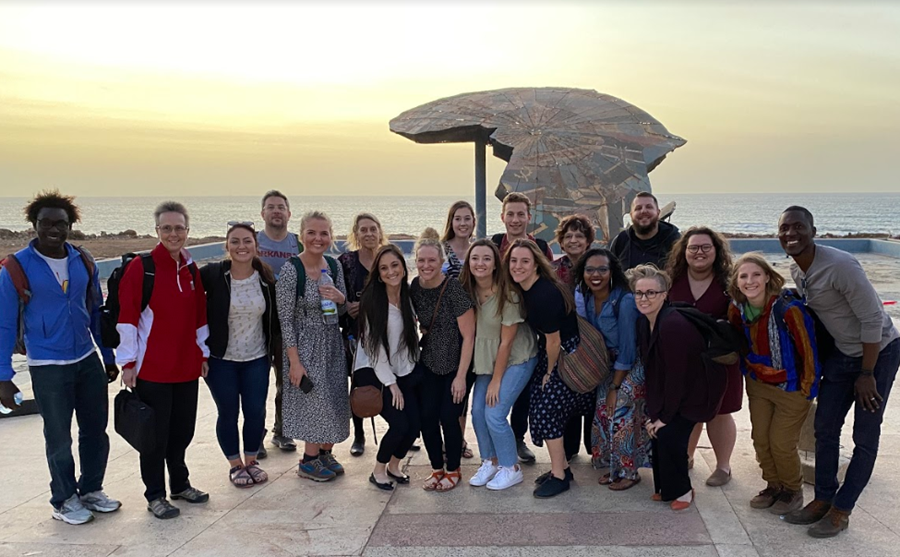
University of Arkansas kinesiology major Charlie Rodgers struggled to sum up his recent visit to Senegal.
"We experienced a feeling. A connection with the people," he said.
Instead of words, he shared pictures, apologizing for the volume.
"I just couldn't stop," he said with a laugh.
The photos were snapped while he and a dozen other students visited the West African nation last month. They were there to evaluate how Senegalese sport leaders were using methods taught during a two-week workshop held on the U of A campus.
Seventeen sports leaders, or Fellows, from Senegal visited the U of A six months ago to learn an innovative method for teaching sports to children that integrates physical and mental health education. It was developed as part of a U of A course taught by three faculty members: Merry Moiseichik, professor of recreation and sport management; Jean Henry, associate professor of community health promotion; and David Christian, assistant professor of counselor education. All three traveled to Senegal with the students.
The course included various learning opportunities and teaching methods. Faculty members worked together to develop the curriculum, teach content and create an experience for students that went beyond a typical class. The two-week workshop for the Senegalese was taught and implemented completely by U of A students with faculty as advisors and facilitators. Students got to know the Senegalese youth sport workers well and learn about their culture.
But actually visiting Senegal last month proved more eye-opening and immersive for them, professor Moiseichik said.
"Watching a youth-sport worker teach ping pong with no ping pong tables was amazing," she said. "Eventually, they put desktops on tires to create the table and although the net did not exist, these 10-year-olds would have beaten any of us in the game."
The group learned about "street boys" a prevalent sight in Dakar, the capitol, where boys were being used to beg for money. Two of the programs they visited were designed to help get the boys off the street, get reunited with families or learn a trade to support themselves.
Based on the students' workshop recommendations, a swimming program had more than doubled in the number of children being helped as the program taught participants to be leaders and take up some of the administration of the program, freeing up the leader to recruit more youth.
Moiseichik said they received a warm welcome when they first arrived at the airport in Dakar, even though their flight was delayed by three hours.
"We were showered with hugs and welcomes," she said. "As we visited each of their programs we were given gifts of thanks and when we left, there was a celebration, more gifts, and lots of hugs and tears."
Rachel Relic, a community health promotion graduate student at the U of A, snapped over 2,200 pictures and videos during their 4 ½ days on the ground in Senegal.
Relic, who has two bachelor degrees and a master's degree, said the trip was the highlight of her entire educational experience. She said it not only helped expand her cultural competence, it also helped solidify classroom knowledge with real-world application.
"It put everything into practice," she said.
Rodgers and Relic, who are focused on adolescent exercise, said they brought back lessons from the Fellows that they can apply in their future careers.
The program was funded by the U.S. Department of State's Bureau of Educational and Cultural Affairs' Sports Diplomacy division under the authority of the Fulbright-Hays Act of 1961. Through an International Sports Programming Initiative cooperative agreement with Indiana University, the U of A implemented the two-way sport and cultural exchange with Senegal.
Rodgers said the class was engaging from the beginning, first as they developed the program for the sport leaders and then while working with the Fellows on campus and throughout Northwest Arkansas. Knowing they would travel to Senegal to see how their workshop had been implemented added a real-world feel, he said.
"It was the most invested I've ever been in a class," he said.
Relic said stepping out of the classroom and onto Senegalese soil was exciting — and challenging. She tried to learn French before the visit, but there was definitely a language barrier, she said. Interpreters helped and she regularly used the Google Translate app on her iPhone.
The last piece of the program is ongoing. The goal is to continue being a resource to the Senegalese Fellows, said professor Henry, who teaches public health promotion at the U of A.
That doesn't appear to be a problem as Rodgers and Relic are in touch often with Fellows. For example, Rodgers is helping one Fellow navigate a move to the United States to earn a degree. The students remain in conversation with the Fellows, swapping strategies and interventions all in the service of helping children succeed.
Topics
Contacts
Shannon G. Magsam, director of communications
College of Education and Health Professions
479-575-3138, magsam@uark.edu